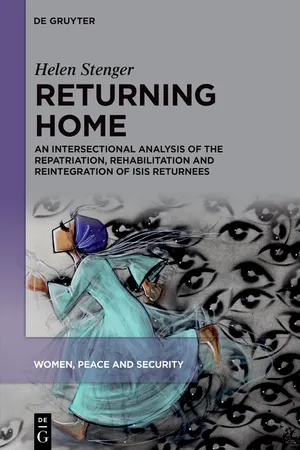
Returning Home
An Intersectional Analysis of the Repatriation, Rehabilitation and Reintegration of ISIS Returnees
- 173 pages
- English
- ePUB (mobile friendly)
- Available on iOS & Android
Returning Home
An Intersectional Analysis of the Repatriation, Rehabilitation and Reintegration of ISIS Returnees
About this book
In March 2019, ISIS was territorially defeated. ISIS members were captured and detained: men were sent to prison and women and children to camps in northern Syria. This is an unprecedented situation where for the first-time thousands of female members of a terrorist group are detained in a foreign country without access to legal mechanisms, rehabilitation or reintegration measures. What happens to the foreign women (and children) who are not repatriated from the camps? If they are repatriated, are there rehabilitation and reintegration programmes in place that account for the experiences the women had?
Most existing rehabilitation and reintegration programmes are gender-neutral; that is, they claim to be universal, and are not tailored specifically to male or female beneficiaries. Yet, typically, these programmes are influenced by implicit gender norms and assumptions, such as that men are violent perpetrators of aggression and women are victims who are peaceful and lack agency. Alongside gender norms, intersecting racial and religious dynamics also shape how governments handle the repatriation, rehabilitation and reintegration of ISIS returnees. This includes racial profiling, the conflation between Islam and extremism and more broadly the rising Islamophobia in many countries, particularly since the 'War on Terror'. These dynamics lead to an absence of rehabilitation and reintegration programmes specifically designed for women's diverse experiences, which is the subject of this book.
Returning Home examines state responses to repatriation, rehabilitation and reintegration of ISIS returnees from an intersectional perspective, with a focus on ISIS women returnees. This book addresses the biased understandings that are built into scholarship and policy responses that reinforce gendered and racialized inequalities. It outlines how these dynamics can be uncovered and redressed by designing policies that are responsive to gender differences, inequalities and harmful norms.
.
Frequently asked questions
- Essential is ideal for learners and professionals who enjoy exploring a wide range of subjects. Access the Essential Library with 800,000+ trusted titles and best-sellers across business, personal growth, and the humanities. Includes unlimited reading time and Standard Read Aloud voice.
- Complete: Perfect for advanced learners and researchers needing full, unrestricted access. Unlock 1.4M+ books across hundreds of subjects, including academic and specialized titles. The Complete Plan also includes advanced features like Premium Read Aloud and Research Assistant.
Please note we cannot support devices running on iOS 13 and Android 7 or earlier. Learn more about using the app.
Information
Table of contents
- Title Page
- Copyright
- Contents
- List of Tabels and Figures
- Abbreviations
- Chapter 1 An Intersectional Approach to Repatriation, Rehabilitation and Reintegration of ISIS Returnees
- Chapter 2 Feminism and Extremism: We Cannot Understand One Without the Other
- Chapter 3 Repatriation: Why States Choose to Repatriate Returnees
- Chapter 4 Rehabilitation: The Impact of Gendered, Religious and Racialised Assumptions
- Chapter 5 Reintegration: The Nexus between Stigma and Narrative
- Chapter 6 Redressing the Gendered Gaps in Repatriation, Rehabilitation and Reintegration
- Chapter 7 Towards Intersectional Repatriation, Rehabilitation and Reintegration
- Appendices
- Index